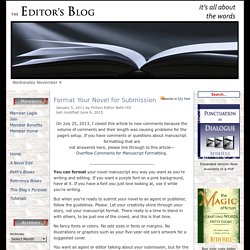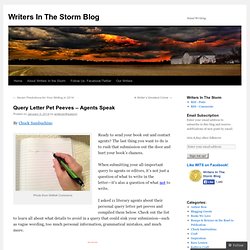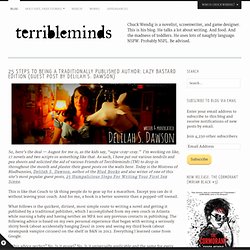

How to Format Your Novel Manuscript. January 5, 2011 by Fiction Editor Beth Hill last modified June 6, 2015 On July 25, 2013, I closed this article to new comments because the volume of comments and their length was causing problems for the page’s setup.

If you have comments or questions about manuscript formatting that are not answered here, please link through to this article—Overflow Comments for Manuscript Formatting. You can format your novel manuscript any way you want as you’re writing and editing. If you want a purple font on a pink background, have at it. If you have a font you just love looking at, use it while you’re writing. But when you’re ready to submit your novel to an agent or publisher, follow the guidelines. No fancy fonts or colors. You want an agent or editor talking about your submission, but for the right reasons. Don’t give harried agents and editors an excuse to toss your manuscript before they’ve read the first word.
So how do you format a novel manuscript an acceptable way? Include a title page— Query Letter Pet Peeves – Agents Speak. By Chuck Sambuchino Photo from WANA Commons Ready to send your book out and contact agents?

The last thing you want to do is to rush that submission out the door and hurt your book’s chances. When submitting your all-important query to agents or editors, it’s not just a question of what to write in the letter—it’s also a question of what not to write. I asked 11 literary agents about their personal query letter pet peeves and compiled them below. “I think the biggest querying no-no I’ve ever seen was when an author tracked down some sensitive personal information and included it in their cover letter.
The biggest no-no I’ve seen recently probably would be authors whose query letters focus too much on their author bios and don’t tell me what their book is about! ~ Shira Hoffman of McIntosh & Otis, Inc.For more advice from Shira, click the link above. ~ Jacquie Flynn of Joelle Delbourgo AssociatesFor more advice from Jacquie, click the link above click. “I’m sick of vagueness. (Hi, everyone. 25 Steps to Being a Traditionally Published Author. So, here’s the deal — August for me is, as the kids say, “supa-cray-cray.”

I’m working on like, 17 novels and two scripts or something like that. As such, I have put out various tendrils and pea shoots and solicited the aid of various Friends of Terribleminds (TM) to drop in throughout the month and plaster their guest posts on the walls here. Today is the Mistress of Bludbunnies, Delilah S. Dawson, author of the Blud Books and also writer of one of this site’s most popular guest posts, 25 Humpalicious Steps For Writing Your First Sex Scene.
This is like that Couch to 5k thing people do to gear up for a marathon. What follows is the quickest, dirtiest, most simple route to writing a novel and getting it published by a traditional publisher, which I accomplished from my own couch in Atlanta while nursing a baby and having neither an MFA nor any previous contacts in publishing.
Is this advice perfect? Seriously. This is no secret. When I started writing my first book, I stopped reading. 11 Frequently Asked Questions About Book Royalties, Advances and Money. GIVEAWAY: I am (again) excited to give away a free copy of the new 2013 Guide to Literary Agents to a random commenter.

Comment within one week; winners must live in Canada/US to receive the book by mail. Good luck to all and Happy Holidays! (Update: Allison won.) If you’re going to wheel and deal with literary agents and editors, you’ll end up spending more time than you’d like discussing rights, contracts, advances, royalties and a whole lot of other boring important stuff. That said, I want to address the most common questions regarding how advances and royalties work. 1. You sign a contract with a publisher. Flat fee: a set amount of money upfront that’s yours to keep. 2.
An advance against royalties. 3. No. 4. Totally depends on the cost of the book and your contract and how much it is to produce copies of the work. Find the Agent Who Will Find You a Publisher.